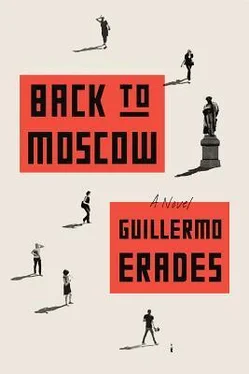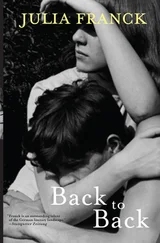We carried on and soon we were at the garden entrance to Scandinavia.
‘This is where I live,’ I said, casually, as if it was only by chance that we’d arrived at my building. With one hand I was carrying the watermelon, with the other I was pointing at the balconies on the top floor.
‘Nice place.’
‘Let’s go up for a cup of tea,’ I said and, not waiting for an answer, I grabbed her hand and led her towards the door of my building.
THE OFFICIAL VERSION — AS I first heard it from Lyudmila Aleksandrovna — is that Aleksandr Sergeyevich was going through tough times. On top of financial difficulties, he was bored of aristocratic life in Peter, and, for some reason, pissed off at the tsar. It was at that low moment in his life that his enemies spread a rumour that linked D’Anthès, a French exile and notorious womaniser, to Natalya Nikolaevna, Pushkin’s beautiful wife. So Aleksandr Sergeyevich, who was not only the greatest of poets but also an honourable gentleman, challenged D’Anthès to a duel.
Of course, when I first heard the story, I assumed there was more to it, some facts buried in order to avoid a scandal. You can be as Russian and romantic as you want, but you don’t go around asking someone to shoot you with a gun for nothing.
In any case, despite attempts by his friends to avert the duel, on the fateful morning of 27 January 1837, Aleksandr Sergeyevich Pushkin met D’Anthès in a forest outside Peter. Pushkin got shot in the stomach and fell, bleeding, on the snow. He was taken back home to Peter, put to bed. After two days of agony, he died. He was thirty-seven.
When I went up to Peter for a weekend I visited Pushkin’s last apartment, a museum these days, and was shown around by a very old and very devoted guide. She narrated the story of Pushkin’s final days with enormous dedication, interpreting the voices of the different characters, as if telling a fairy tale to a child. I found myself absorbed in the storytelling and, as I listened to the monologue that the guide must have repeated thousands of times, I could picture Aleksandr Sergeyevich vividly, in his flat, but also in the forest, pointing the gun, receiving the shot, falling in the snow, firing a shot that only wounded D’Anthès’ arm. By the time the babushka had finished her narration, all the museum visitors were standing around her, next to the exhibit of a gun similar to the ones used by Pushkin and D’Anthès.
As far as I could tell, Russians are divided on Pushkin’s wife. Some, like Vika or Lyudmila Aleksandrovna, seemed to believe the official version, the beautiful love story depicted in statues and monuments across the country — such as the golden statue of Aleksandr Sergeyevich and Natalya in the middle of the Old Arbat, at whose feet young Moscow lovers lay bouquets of flowers.
Others think differently. All these years, entire generations of more cynical Russians have blamed Natalya for Pushkin’s death.
In the end, we will never know what really happened between Natalya and D’Anthès. Besides, in the eyes of most Russians, causing Pushkin’s death is not Natalya’s worst sin. Natalya is most loathed for not understanding Pushkin’s greatness, for taking him lightly. For that, she cannot be forgiven.
Yet, Pushkin’s self-induced death doesn’t make much sense. From a historical and artistic perspective he was a successful man. Why did he risk his precious life in a stupid duel? Fuck knows. But whatever his reasons, his early death assured him the kind of glory older people don’t attain. It made him an instant legend. And whether D’Anthès was banging Natalya or not is, to a certain extent, irrelevant.
Perhaps, if Aleksandr Sergeyevich was unhappy at the time, he thought that risking his life was worth a shot and that, whatever the outcome of his duel, at least things would no longer be the same.
BEING ON THE TOP floor, on summer days my flat was always hot. I had left the balcony doors open and now flies were circling in the middle of the living room. Except they weren’t exactly circling. Moscow flies had a peculiar way of moving around — they flew in straight lines, turning in sharp corners, drawing geometrical figures in the air, as if avoiding walls that were invisible to my eyes.
Vika and I lay sweating on the couch. I was observing the flies, trying to remember a passage from Turgenev’s Nest of the Gentry , where Marfa Timofeevna, the bitter old lady, says something about envying the simple life of flies until she’d heard a fly complaining in a spider’s web.
Vika was breathing into my neck, her hair all over my face. She felt unusually warm, her skin sticky. Once naked, her petite body was somewhat softer than I’d expected. Unlike Tatyana’s, Vika’s thighs were round and fleshy.
I was hit by a sudden urge to leave my flat.
‘Let’s go and grab some lunch,’ I said.
‘Now?’ She kissed my neck. ‘Maybe we can stay here for a little while, eat the watermelon.’
‘It’s too hot in here,’ I said.
The voices from Scandinavia’s terrace came over the balcony. I could recognise some of the brothers’. If only Vika would leave now, I thought, I could go down and enjoy a cold beer and a hamburger with the brothers, then come back for some sleep.
I felt dark clouds forming in my head. I stood up and went to the shower. It was that time of year when my building had no central hot water — the profilaktika, they called it, about three weeks every summer during which, I was told, the hot water of entire neighbourhoods was cut so that the pipes could be serviced. It was a collective purifying ritual of sorts that Muscovites seemed to endure without much protest.
The icy water washed away some of my sorrow, brought me back to life.
Back in the living room, I slipped back into my jeans, sat next to Vika. She lay inert and naked on the couch. I placed my hand between her legs — she was freshly shaved, the skin of her pubic area reddish and irritated. She smiled, placed her arms around me, kissed my ear. I concentrated hard on pushing Tatyana’s image out of my mind. Vika was a wonderful girl, I told myself, and, for the few seconds I could maintain the fantasy of Tatyana’s non-existence, I enjoyed Vika’s company. But as soon as Tatyana forced herself back into my head, my chest tightened and Vika’s presence in my flat felt oppressive.
Vika stood up, walked into the bathroom, washed herself. Back in the living room, she let her yellow dress unfold over her head and cover her body. We went down to the street.
‘Why don’t we just have something to eat here?’ Vika said, pointing at the tables of Scandinavia. The waitresses, who knew me by sight, carried trays with grilled burgers, fresh salads, cold beer.
‘I feel like walking,’ I said. ‘Let’s go somewhere else.’
We strolled down Tverskaya, turned left at the end and crossed the street into Teatralnaya Ploschad. We sat down at a summer terrace with orange plastic tables, next to the Metropol hotel.
When the waitress brought our food, Vika was talking about her family, something about a brother, or a cousin — in Russian you never knew. I wasn’t really following what she was saying. At a nearby table a group of foreign businessmen, guests at the Metropol, I figured, were drinking beer and talking loudly, in English. They were accompanied by three young Russian women, who laughed wildly at each of their stupid comments.
I was overcome by a wave of exhaustion. I didn’t feel like talking. It was as if all the anticipation, all the hunger, had evaporated in a matter of seconds on my couch. All I wanted now was to be left alone.
I thought about Tatyana, about how she gave me space, even when she was in my flat, about the unobtrusiveness of her presence. Tomorrow evening she’ll be back home, I thought.
Читать дальше












